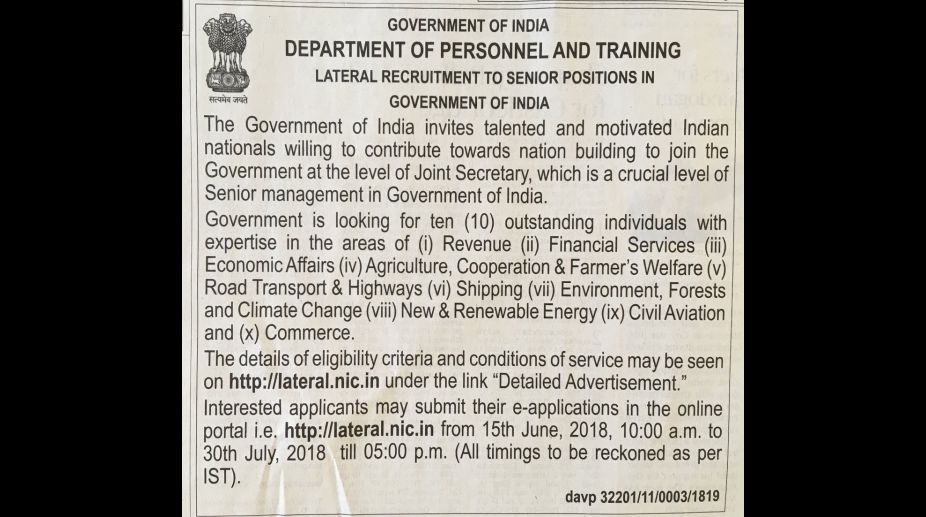IAS officers treat the laterally recruited officers as ‘outsiders’ and ‘inferior’.
NEW DELHI: Prime Minister Narendra Modi’s wish to make domain specialists a part of the executive through lateral entry is getting a strong pushback from the IAS lobby. Unless things change drastically, this innovative method, which was described by many as a desirable step to loosen the hold of a British Raj era system over governance in India, is likely to die a premature death.
PM Modi, with the objective to improve governance, has been pushing for recruiting people who are experts in their respective fields and appoint them as Joint Secretary, Director, and Deputy Secretary in Government of India. These posts, until now have been reserved for Indian Administrative Service (IAS) officials.
The first such notification for recruiting specialists by the Department of Personnel and Training (DopT) in this regard was released in June 2019, inviting applications for ten positions of Joint Secretary-rank posts. Out of the 6,077 applicants who had applied, nine were finally selected—Amber Dubey, Rajeev Saksena, Sujit Kumar Bajpayee, Dinesh Dayanand Jagdale, Bhushan Kumar, Saurabh Mishra, Suman Prasad Singh, Arun Goel and Kakoli Ghosh. All of them were given a three-year contract with the option of it being renewed for two more years.
While Ghosh never joined, Arun Goel resigned in December 2020. Later, Dubey resigned in August 2022. While Goel was vice-president of e-commerce venture ShopClues, before trying his hand as a bureaucrat as a JS, Commerce Ministry, Dubey was a senior partner at KPMG before joining the government as JS Civil Aviation.
So, as of now, only six of the initial nine recruits are working. Government of India later hired three more domain experts in 2021. In February and March 2021, the government received over 2,000 applications for around 40 positions that it advertised, including that of Joint Secretary, Director, and Deputy Secretary. Out of this, 31 were recruited including three Joint Secretaries, 19 Directors and nine Deputy Secretaries, and joined the service in December 2021.
“The interest has gone down as the number of applicants too shows. The applicants for these posts are people who do a lot of research before applying and take feedback about the work environment which they are going to join. One reason for this dying of interest is that even those specialists who are being appointed as JS, even their words do not carry authority within the system. The department people see them as inferior to the direct IAS officers and hence these specialists find it difficult and depressing to work in the system. I personally have seen many instances of orders of lateral recruits being ignored and forgotten by the lower-level officials. This cannot happen unless an unwritten and unspoken dictum of the IAS lobby is at work,” an employee with one of the government departments said.
As per DoPT data, in 2019 for 10 posts, more than 6,000 applications were received; 600 applications per post. However, in 2021, for about 40 posts, 2,000 applications were received, 50 applications for one post.
A close friend of one of the domain specialists, who is still a part of the government, but is planning to quit next year, said that these recruits were treated as “outsiders” and “inferior” by the IAS officers, who have been running the system, which traces its roots back to the Indian Civil Services (ICS), which came into existence in 1854 and was succeeded by the IAS in 1947.
“If you go back to the time before the ICS, there were two types of government servants—the covenanted and the uncovenanted. The first were the British officials and the second were for the ‘lowly’ Indians, who despite being a part of the same system, were seen and treated as inferior by the covenanted. Something similar is happening right now as far as these lateral recruitments are concerned. The IAS officers don’t treat these laterally recruited officers as fellow officers but someone who is an outsider and who is trying to challenge their hold on the system. This is the reason these specialists don’t want to continue for a long time and are looking to leave. One way to address this situation is that their feedback reaches the Prime Minister’s Office so that necessary policy changes can be devised,” he said.

